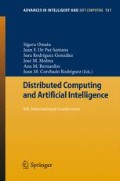Abstract
Game Theory can be used to capture and model the phenomenon of the exploitation of the environment by human beings. The Commons Game is a simple and concise game that elegantly formulates the different behaviors of humans toward the exploitation of resources (also known as “commons”) as seen from a game-theoretic perspective. The game is particularly difficult because it is a multi-player game which requires both competition and cooperation. Besides, to augment the complexity, the various players are unaware of the moves made by the others – they merely observe the consequences of their respective moves. This makes the game extremely difficult to analyze, and there is thus no known method by which one can even understand whether the game has has an equilibrium point or not. In the Commons Game, an ensemble of approaches towards the exploitation of the commons can be modeled by colored cards. In this paper, we consider the cases when, with some probability, the user is aware of the approach (color) which the other players will use in the exploitation of the commons. We investigate the problem of determining the best probability value with which a specific player can play each color in order to maximize his ultimate score. Our solution to this problem is an “intelligent” heuristic algorithm which determines (i.e., locates in the corresponding space) feasible probability values to be used so as to obtain the maximum average score. The basis for such a strategy is that we believe that results obtained in this manner can be used to work towards a “expectiminimax” solution, or for a solution which utilizes such values for a UCT-type algorithm. The solution has been rigorously tested by simulations, and the results obtained are, in our opinion, quite impressive. Indeed, as far as we know, this is a pioneering AI-based heuristic solution to the game under the present model of computation.
Access this chapter
Tax calculation will be finalised at checkout
Purchases are for personal use only
Preview
Unable to display preview. Download preview PDF.
References
Baba, N., Handa, H.: COMMONS GAME Made more Exciting by an Intelligent Utilization of the Two Evolutionary Algorithms, vol. 71 (2007)
Baba, N., Nagasawa, K., Handa, H.: Utilization of Soft Computing Techniques for Making Environmental Games More Exciting –Toward an Effective Utilization of the COMMONS GAME. In: Lovrek, I., Howlett, R.J., Jain, L.C. (eds.) KES 2008, Part II. LNCS (LNAI), vol. 5178, pp. 411–417. Springer, Heidelberg (2008)
Baba, N., Sakurai, Y., Matsuda, A., Kawachi, T.: Soft computing techniques for making game playing exciting, pp. 132–135 (2005)
Brown, J.S., Vincent, T.L.: Evolution of cooperation with shared costs and benefits. Proceedings of the Royal Society B: Biological Sciences 275(1646), 1985–1994 (2008)
Hardin, G.: The Tragedy of the Commons. Science 162(3859), 1243–1248 (1968)
Hardin, G., Baden, J.: Managing the Commons. Freeman, San Francisco (1977)
Kocsis, L., Szepesvári, C.: Bandit Based Monte-Carlo Planning. In: Fürnkranz, J., Scheffer, T., Spiliopoulou, M. (eds.) ECML 2006. LNCS (LNAI), vol. 4212, pp. 282–293. Springer, Heidelberg (2006)
Powers, R., Duss, R., Norton, R.: THE COMMONS GAME Manual (1977)
Russell, S.J., Norvig, P.: Artificial intelligence: A Modern Approach, 3rd edn. Prentice-Hall, Inc., Upper Saddle River (2009)
Author information
Authors and Affiliations
Corresponding author
Editor information
Editors and Affiliations
Rights and permissions
Copyright information
© 2012 Springer-Verlag Berlin Heidelberg
About this paper
Cite this paper
Sakhravi, R., Omran, M.T., Oommen, B.J. (2012). A Fast Heuristic Solution for the Commons Game. In: Omatu, S., De Paz Santana, J., González, S., Molina, J., Bernardos, A., Rodríguez, J. (eds) Distributed Computing and Artificial Intelligence. Advances in Intelligent and Soft Computing, vol 151. Springer, Berlin, Heidelberg. https://doi.org/10.1007/978-3-642-28765-7_11
Download citation
DOI: https://doi.org/10.1007/978-3-642-28765-7_11
Publisher Name: Springer, Berlin, Heidelberg
Print ISBN: 978-3-642-28764-0
Online ISBN: 978-3-642-28765-7
eBook Packages: EngineeringEngineering (R0)

